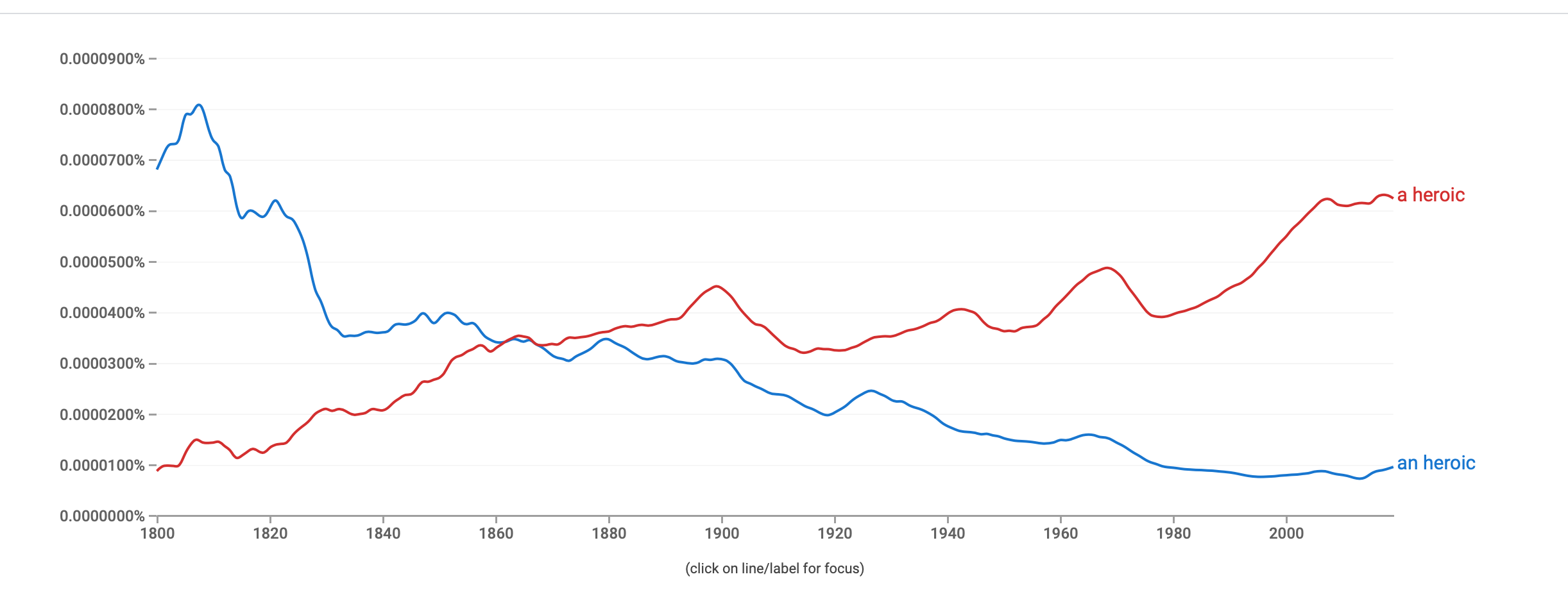English can be very difficult, especially if you are still getting used to the more detailed parts of speech. For instance, articles such as “a” and “an” seem to have secret rules that only some people claim to know. Should we use “a” or “an” before the letter “h?” Is it “a heroic” or “an heroic?” You were most likely taught that all words starting with vowels should be preceded with “an,” and all words starting with consonants should be preceded with an “a.” Is this fully true?
Most people subconsciously agree that words starting with a silent “h” must be preceded with “an” because their initial sound is similar to a vowel. Some people insist on going further, claiming that you should put “an” before most words that start with an “h.”
This viewpoint is old-fashioned and usually doesn’t sound right to our modern ears. Does it have some merit, though?
Using “An” Based On Sounds
The placement of “an” in a sentence has to do with pronunciation. Some words that start with an “h” sound horrible with “an,” whereas others sound great.
For instance, you wouldn’t put “an” before words like “horrible” or “hateful,” but you may with others like “historical.” It gets even more confusing when you realize words like “historical” sound good with “an,” but similar words like “historic” don’t.
In reality, the importance is found within the syllables of the stressed word. For h-words that have a strong first syllable, you fully pronounce the “h” sound. You want to precede these words with an “a,” as they sound more like consonants than vowels.
On the other hand, h-words with a stronger syllable usually have a silent beginning. This means the first vowel of the word is usually pronounced. For these, you would want to use “an” because they sound more like vowels than consonants.
Is “An” Falling Out Of Popularity?
Unfortunately, due to the strong pushback by young English speakers, many reputable sources are avoiding the use of “an” for all words starting with an “h.” Styles such as the Guardian, Telegraph, and even Oxford have taken this stance.
Here are some examples:
“If you think Antony Gormley is a good sculptor, go and see the childish figures he carved on boulders outside the British Library in London. Jenny Saville? A heroic mediocrity.” – The Guardian
Mr. Wall said: “George has, and always has had, the complete support of the board, as he should have. He’s done a heroic job.” – The New York Times
However, unless you are writing in these styles, the distinction isn’t too important. It is good to know and can even be a fun party trick. Usually however, it’s not the thing that would make or break a job interview! With this, the best suggestion is to simply use whichever one sounds best in the context of what you are writing.
To drive the point home, here are some examples of an heroic from the very same outlet:
“The OBR says companies will increase spending on new plant and machinery by 5% in 2014 and 9% in each of the three subsequent years. This looks like an heroic assumption.” – The Guardian
Although, the trend is certainly towards the use of a rather than an, as this Google Ngram Graph clearly shows:

Summary
In the end, facets of the English language such as articles can be tricky for even the most adept writer. Many people question if words starting with an “h” should be preceded with an “an” or an “a.”
Some people are sticklers for rules, claiming that all words starting with an “h” should be preceded with an “a.” For most cases, however, if your word starts with a vowel-like sound, you are probably safe beginning with “an.” Similarly, if your word has a more consonant-like sound, you should probably precede it with an “a.”
Watch This Video for a More Information
Want to sharpen your business writing skills? Discover our acclaimed online courses at syntaxtraining.com Whether you want to learn about taking taking meeting notes, become a master proofreader, master punctuation or tune-up your business writing skills, our courses are here to help you.






